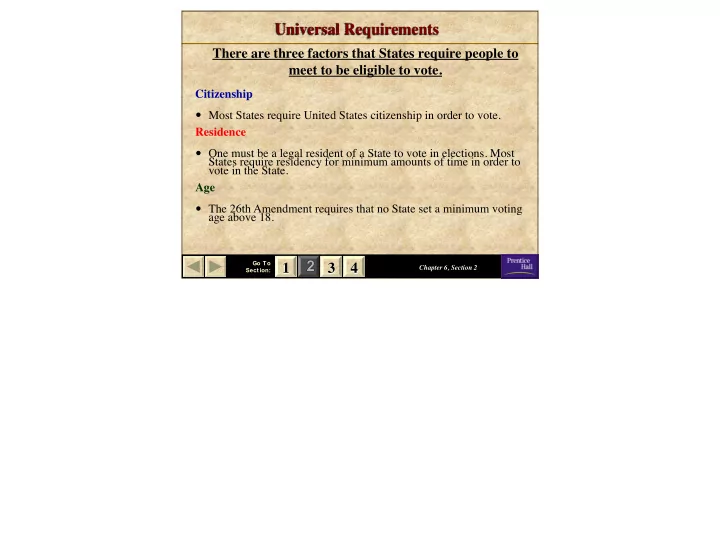

Universal Requirements There are three factors that States require people to meet to be eligible to vote. Citizenship • Most States require United States citizenship in order to vote. Residence • One must be a legal resident of a State to vote in elections. Most States require residency for minimum amounts of time in order to vote in the State. Age • The 26th Amendment requires that no State set a minimum voting age above 18. 1 2 3 4 Go To 1 3 4 Chapter 6, Section 2 Section:
Other Qualifications • All states except North Dakota require citizens to register to vote. Registration is a procedure of voter identification intended to prevent fraudulent voting. • Literacy —a person’s ability to read or write—is no longer required in any State to vote, but had been by several States at times in our nation’s history. • At one time, poll taxes , or a special tax payment required to vote, were prevalent in the South. Poll taxes are now forbidden by the 24th Amendment. • States also have restrictions on the right to vote on certain members of the population, such as those found to be mentally incompetent or people convicted of serious crimes. 1 2 3 4 Go To 1 3 4 Chapter 6, Section 2 Section:
Political Participation and Awareness in America 1 1 2 3 3 4 4 Go To Chapter 6, Section 2 Section:
Section 2 Review 1. The three universal requirements States use for a person to be eligible to vote are (a) residence, gender, and income. (b) citizenship, property ownership, and gender. (c) citizenship, residence, and age. (d) income, employment, and age. 2. The 24th Amendment forbids the use of (a) poll taxes. (b) alcohol. (c) literacy tests as a means of voter qualification. (d) the death penalty. Want to connect to the Magruder’s link for this section? Click Here! 1 2 3 4 Go To 1 3 4 Chapter 6, Section 2 Section:
S E C T I O N 3 Suffrage and Civil Rights • What rights are guaranteed by the 15th Amendment, and what tactics were used in the past to circumvent those rights? • How significant was early civil rights legislation passed in 1957, 1960, and 1964? • What are the provisions and effects of the Voting Rights Act of 1965? 1 2 3 4 Go To 1 2 4 Chapter 6, Section 3 Section:
The Fifteenth Amendment The Fifteenth Amendment (1870) declares that the right to vote cannot be denied to any citizen of 1 2 3 4 Go To 1 2 4 Chapter 6, Section 3 Section:
Early Civil Rights Legislation • Created the United States Civil Rights Commission • Civil Rights Investigated and reported voter discrimination Act of 1957 • Gave the Attorney General the power to require federal courts to issue orders to prevent any interference with a person’s right to vote Civil Rights Act • Created federal voting referees who helped correct of 1960 conditions to prevent voter discrimination 1 2 3 4 Go To 1 2 4 Chapter 6, Section 3 Section:
The Civil Rights Act of 1964 The Aftermath The Law • More far-reaching than the Civil • The violent response of civilians and police and state troopers to a Rights Acts of 1957 and 1960 , voter registration drive mounted the Civil Rights Act of 1964 by Dr. Martin Luther King, Jr. in Selma, Alabama showed that the abolished the use of voter Civil Rights Acts of 1957, 1960 registration or a literacy and 1964 were still not enough to ensure voter equality. requirement to discriminate against any voter. • Its enforcement relied on judicial action and the use of 1 2 3 4 Go To 1 2 4 Chapter 6, Section 3 Section:
The Voting Rights Act of 1965 1 2 3 4 Go To 1 2 4 Chapter 6, Section 3 Section:
African Americans at the Polls 1 1 2 2 3 4 4 Go To Chapter 6, Section 3 Section:
Recommend
More recommend